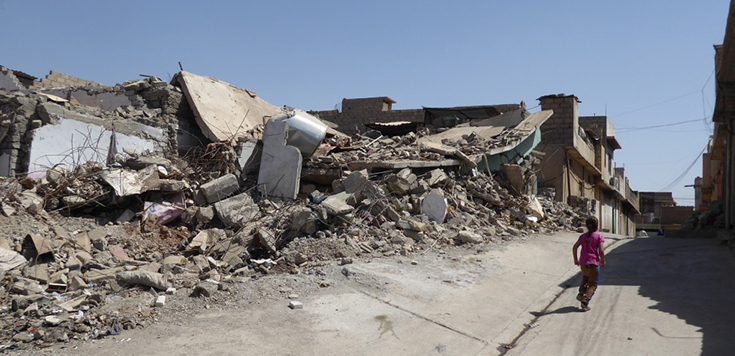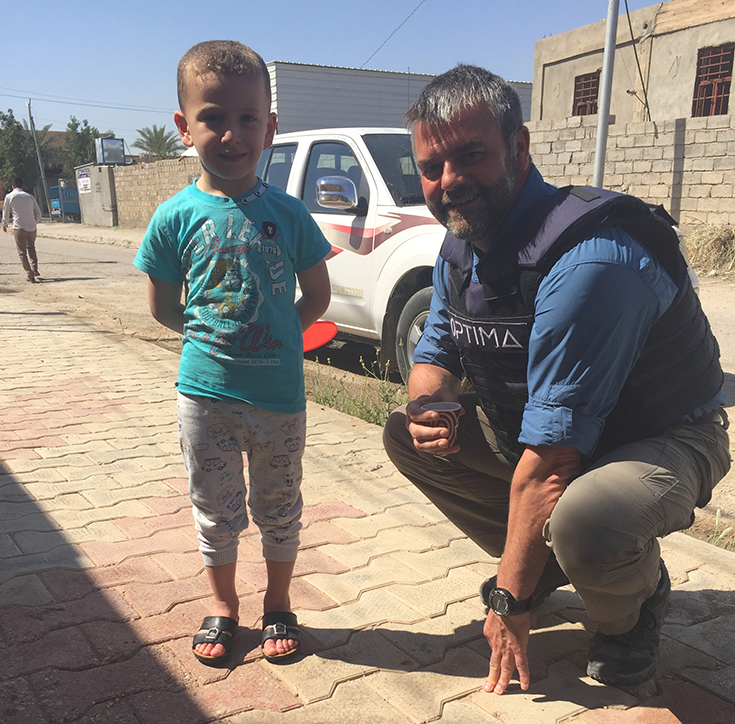Parliamentary inquiry into humanitarian standards in IED detection and disposal
UK Parliamentarians launch inquiry into humanitarian standards in detecting and disposing of improvised explosive devices.

Al-Mansour District, Mosul: "We have observed IEDs laid at an industrial scale on fields and roads as counter-mobility obstacles to advancing ISF troops and armour," says Maj Gen Jonathon Shaw, Chairman of Optima Group, in the next issue of CRJ. "In urban areas, we and others have rendered safe sophisticated IEDs found hidden in children’s toys, doors, walls and Qurans, secreted in refuse, laid around critical infrastructure, inside hoovers, microwaves and fridges, as well as buried in the gardens of property with secondary and tertiary means of initiation to kill first responders. We have even seen evidence of ISIS marking buildings as ‘IED cleared’ to tempt civilians into those specific killing areas" (photo courtesy Optima Group)
UK charity Action on Armed Violence states that: “Second only to firearms, improvised explosive devices (IEDs) take more lives every year than any other weapon." The majority of these are civilians: 6,363 already in 2017. The problem, and the number of victims, will only grow.
As dissident groups become more technically adept at creating IEDs, so dealing with them becomes more complicated.
Launching an inquiry into the need for internationally recognised standards in IED detection and disposal in Parliament, Dr Matthew Offord MP, chairman of the All Party Parliamentary Group (APPG) on Explosive Threats said: “Around the world there are a number of very brave people who put themselves in harm’s way finding and disposing of explosive threats. But we know from our previous inquiry into the use of IEDs that they are a very different weapon to legacy landmines and unexploded ordnance, particularly as many may be designed to target the operator. There have been 33 technicians Killed or injured by IEDs in the past 18 months.
“A robust set of international standards is an important part of keeping these people safe.”
The inquiry will take evidence from organisations and individuals involved in all stages of countering IEDs. NATO and the British Military already have strict standards, but as yet there are no internationally agreed standards for humanitarian agencies, which are increasingly being called upon to dismantle or dispose of IEDs.

Optima is currently conducting ETM in the high-risk areas of Fallujah and Mosul (photo courtesy Optima Group)
APPG Co-chairman and Chairman of the Blaythorne Group, Lord Geoffrey Dear said: “In 2001 the International Mine Action Standards (IMAS) were created and have done a marvellous job in providing parameters for clearance of Landmines, cluster munitions and unexploded remnants of war. All of these threats have a certain predictability about them. IEDs are not a new phenomenon and our experience from Iraq and Afghanistan has taught us to treat these weapons with a great deal of respect. The equipment and the protective gear that operators use has to meet stringent standards; now we need standards for operator competence in terms of their knowledge, skill and experience.”
Maj Gen Jonathan Shaw, chairman of explosive threat mitigation company Optima Group said: “We in the industry greatly welcome this inquiry by the cross-party group on Explosive Threats. Optima Group has considerable and current experience of searching for and clearing IEDs in Ramadi, Fallujah and Mosul and will be in Iraq for some time, so we are in a strong position to train operators in humanitarian IEDD and Search.
“As a leading UK company operating in a very hostile environment, we have a duty of care to our staff and those who we authorise as competent to operate in that environment. We at Optima are looking forward to submitting evidence to the inquiry, and to some rigorous outcomes at the end of it.”
-
See CRJ 12:4, published in August, for an article by Maj Gen Jonathon Shaw, Chairman of Optima Group, looking at the importance of IED threat mitigation in the stabilisation and reconstruction process in Iraq
-
The APPG on Explosive Threats draws attention to the ever-present danger of groups and individuals using (often improvised) explosive devices against innocent civilians, and to the organisations working to prevent the placing of such devices, tackling the devices themselves and dealing with the aftermath of their use. The group also has consideration for the humanitarian consequences of the manufacture, possession, sale, purchase, transport and unlawful use of explosive weapons, and to raise the profile of the humanitarian benefits of mine action and C-IED work around the globe, awareness training and capacity building. Through research and inquiry, the group advocates for appropriate policy change and acts as a focal point for debate and the exchange of ideas, views and information.
-
Action on Armed Violence seeks to reduce the impact of armed violence through monitoring and research of the causes and consequences of weapon-based violence. AOAV has a specific focus on the impact of explosive weapons with wide area effects in populated areas and have been running a global monitor of explosive violence since October 2010.
-
Optima enhances human security by mitigating explosive threats in conflict-affected locations. Its client list includes international organisations, national governments, non-governmental organisations and private companies. They use their expertise and experience to help those trying to protect their communities and organisations from the growing range of explosive threats. As well as providing training and advisory services, Optima deploys operational teams to conduct clearance activities in support of stabilisation and reconstruction.
-
Blaythorne Group Ltd. is an independent, established, UK company who specialise in providing security equipment, consultancy and training. Blaythorne predominantly focus on countering the explosive threats facing militaries and security organisations, providing sustainable solutions to combat both conventional and asymmetric challenges; demonstrated through their involvement with NATO’s Maritime Interdiction and Operations Training Centre, Crete, designing and delivering specialised Maritime C-IED courses. Blaythorne also provide Hostile Environment Awareness Training courses to individuals preparing to conduct business in complex environments.